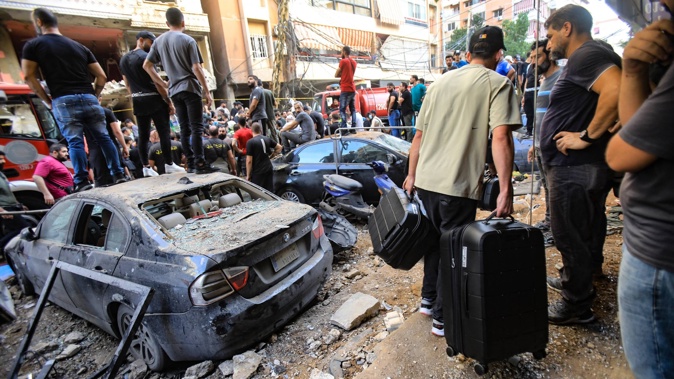
Israel announced it had killed the commander of Hezbollah’s elite unit in a strike on Friday that Lebanese officials said left 12 dead and dozens wounded in the movement’s Beirut stronghold.
Ibrahim Aqil, who was also wanted by the United States for involvement in the 1983 bombing of the US embassy in Beirut, headed the Iran-backed militant group’s elite Radwan Force.
AFP journalists at the scene said the blast left a massive crater and gutted the lower floors of a high-rise building in the Lebanese capital’s southern suburbs, a Hezbollah stronghold.
Aqil’s killing was the second of a senior Hezbollah commander since the start of the war in Gaza, following another Israeli strike in Beirut that in July killed Fuad Shukr, a top operations chief for the movement.
An image grab taken from a UGC video posted on social media on September 17 appears to show an explosion and a man falling to the floor (left) at an indoor vegetable market in Beirut, as hundreds of pagers used by Hezbollah members exploded across Lebanon. Photo / AFP / UGC
It also followed two waves of explosions, on Tuesday and Wednesday, of communication devices used by Hezbollah members, which Hezbollah blamed on Israel.
Those blasts killed dozens and left Hezbollah reeling while dramatically shifting the focus of the Israel-Hamas war northwards.
Stephane Dujarric, spokesman for UN Secretary-General Antonio Guterres, said they were “of course, very concerned about the heightened escalation” and called for “maximum restraint” from all sides.
The Israeli military said it conducted a “targeted strike” to kill Aqil and which also killed around 10 other senior Radwan commanders.
 People gather in front of a building targeted by an Israeli strike in Beirut's southern suburbs. The strike on Hezbollah's stronghold in Lebanon's capital Beirut left 12 dead and dozens wounded. Photo / AFP
People gather in front of a building targeted by an Israeli strike in Beirut's southern suburbs. The strike on Hezbollah's stronghold in Lebanon's capital Beirut left 12 dead and dozens wounded. Photo / AFP
Lebanon’s Health Ministry said the attack killed 12 people and wounded 66 more.
Earlier, a source close to Hezbollah, requesting anonymity to discuss sensitive matters, said the strike had claimed Aqil’s life.
“The Israeli air strike killed Radwan Force commander Ibrahim Aqil, its armed force’s second-in-command,” the source close to Hezbollah said.
The movement has not officially confirmed his death, but it said after the strike that it targeted with rockets an Israeli intelligence base it blamed for unspecified “assassinations”.
The United States had offered a US$7 million ($11.2m) reward for information on Aqil, describing him as a “principal member” of another organisation that claimed the 1983 embassy bombing, which killed 63 people.
Communication device explosions
Israeli troops and Hezbollah fighters have battled each other along the Israel-Lebanon border since Hamas Palestinian militants triggered the war in Gaza with their October 7 attack.
The focus of Israel’s firepower for nearly a year has been on Gaza, but with Hamas much weakened, the focus of the war has moved to Israel’s northern border.
Israeli military spokesman Rear Admiral Daniel Hagari said after the strike on Friday that Israel was “not aiming for a broad escalation in the region”.
Hamas called it a “brutal and terrorist aggression” and an “escalation”.
Months of near-daily border clashes have killed hundreds in Lebanon, most of them fighters, and dozens in Israel, and forced thousands on both sides to flee their homes.
On Tuesday and Wednesday, Hezbollah was hit by an unprecedented attack that it has blamed on Israel, though Israel has yet to comment.
The attack saw thousands of Hezbollah operatives’ communication devices explode across two days, killing 37 people and wounding thousands more.
Hezbollah chief Hassan Nasrallah vowed on Thursday that Israel would face retribution for the blasts.
Earlier on Friday, Israel said Hezbollah had fired dozens of rockets from Lebanon after air strikes that destroyed dozens of the militant group’s launchers.
Speaking to troops on Wednesday, Israeli Defence Minister Yoav Gallant said: “Hezbollah will pay an increasing price” as Israel tries to “ensure the safe return” of its citizens to border areas.
“We are at the start of a new phase in the war,” he said.
‘Fear of wider war’
Israeli Prime Minister Benjamin Netanyahu delayed by a day his scheduled departure to the United States, where he is due to address the United Nations General Assembly, with an official citing the situation on the northern front.
Earlier on Friday, Hezbollah said it targeted at least six Israeli military bases with salvos of rockets after bombardment that people in south Lebanon described as among the fiercest so far.
Residents of Marjayoun, a Lebanese town close to the border, said the overnight bombardment was among the heaviest since the border clashes began last October.
“We were very scared, especially for my grandchildren,” said Nuha Abdo, 62. “We were moving them from one room to another.”
Clothing store owner Elie Rmeih, 45, counted more than 50 strikes.
“It was a terrifying scene and unlike anything we have experienced since the escalation began.
“We live in fear of a wider war, you don’t know where to go.”
Calls for restraint
International mediators have been scrambling to stop the Gaza war from turning into an all-out regional conflict.
US Secretary of State Antony Blinken, who has tried to salvage efforts for a Gaza ceasefire and hostage release deal, called for restraint on all sides.
“We don’t want to see any escalatory actions by any party” that would endanger the goal of a Gaza ceasefire, he said.
Hamas’s October 7 attacks that sparked the Gaza war resulted in the deaths of 1205 people, mostly civilians, on the Israeli side, according to an AFP tally based on Israeli official figures that include hostages killed in captivity.
Out of 251 hostages seized by militants, 97 are still held in Gaza, including 33 the Israeli military says are dead.
Israel’s retaliatory military offensive has killed at least 41,272 people in Gaza, most of them civilians, according to figures provided by the Hamas-run territory’s health ministry. The United Nations has acknowledged the figures as reliable.
- AFP
Take your Radio, Podcasts and Music with you









